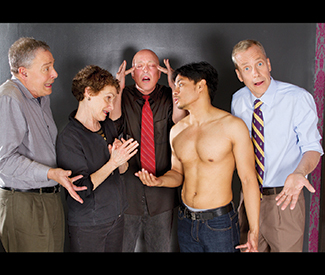arts@sfbg.com
THEATER Theatre Rhinoceros had a big enough success with The Habit of Art last spring to bring it back for a final run, allowing more people, this reviewer included, the chance to see the 2009 follow-up to The History Boys by England’s rightly beloved Alan Bennett. Judging by the production, it’s also possible they were just having too much fun with it to stop so soon. But then that would speak as much to the themes of the play as to its decidedly playful construction. As a play-within-a-play-within-a-rehearsal, The Habit of Art ends up, among much else, a cleverly crafted paean to the lure of theater itself.
As with several of his other well-known plays, including the Madness of King George III and Single Spies (the latter, a shrewd pair of one acts on the Cambridge Five spy ring, was essayed by Theatre Rhino in 2004), Bennett finds inspiration in the real lives of eccentric Englishmen, whether long since passed or roughly contemporary. Here, the playwright imagines a fictitious meeting between two giants of his own time: W.H. Auden (Donald Currie) and Benjamin Britten (John Fisher).
The poet and the composer did know each other in real life, and had been collaborators at times. But Bennett brings the two men together for one more tête-à-tête, in 1972, a year before Auden’s death and some quarter of a century after they had parted ways in the wake of their work on the operetta Paul Bunyan, a critical failure. Interestingly, their meeting has many brokers — a biographer (Ryan Tasker), a stage manager (Tamar Cohn), a playwright (Michael DeMartini), and the real playwright, Bennett himself — yet feels personal and vivid, at once jocularly familiar and freighted with a sad awareness of time spent.
But that encounter takes place only in act two, sandwiched in a lively rehearsal of the play-within-the-play, a work called “Caliban’s Day,” inspired by Auden’s long poem, The Sea and the Mirror. That poem, which imagines the characters of Shakespeare’s The Tempest in dialogue with the author and his audience, is itself partly a meditation on the tangled natures of life and art. And in the back and forth between the “play” being staged and the actors and crew rehearsing it, we get Bennett’s subtle, witty, unflinchingly raunchy measure of a life lived in artistic creation.
Act one, which sets up the turmoil that act two engages and in some sense subdues, belongs to Auden as well as the addled actor playing him, who can’t quite remember his lines (both embodied with a lively and beautifully measured insouciance by Currie). Having recently returned to Oxford, Auden lives at his alma mater in a cluttered and untidy room like a rowdy teen. His less than sanitary disposition comes coupled with an abrasive temperament that wins him few admirers despite his status as a grand master and living legend. At one point, he tactlessly and unapologetically mistakes a visit from BBC reporter and future biographer Humphrey Carpenter (an excellent Tasker, replacing Craig Souza in the role) for his rent boy (an even-keeled Justin Lucas) — a figure who comes to stand, defiantly, for all those left out by posterity.
Act two finds Britten (played with an almost wooden reserve by director Fisher) approaching his old friend in an anxious mood over his current project, an opera based on Thomas Mann’s Death in Venice. Here the play’s true themes come into view, as the two aging artists, under the gaze of their mutual biographer and very much opposites in most ways, circle a common need for the certainty of art like desert vagrants at a watering hole: It may be a mirage, but it’s a life-saving one just the same.
If the disheveled book shelves, garden of crumpled paper balls, and two upstage pianos (in Gilbert Johnson’s scenic design) seems to belie the neatness of the play’s construction, Bennett’s care and control evoke precisely the untidiness of life. It’s maybe this that attracts him more than anything else — the messiness of personality, love, sex, art, loyalty, and all of the things we’d like to think of as pure and inviolate. *
THE HABIT OF ART
Wed/20-Sat/23, 8pm (also Sat/23, 3pm), $15-$25
Eureka Theatre
215 Jackson, SF

